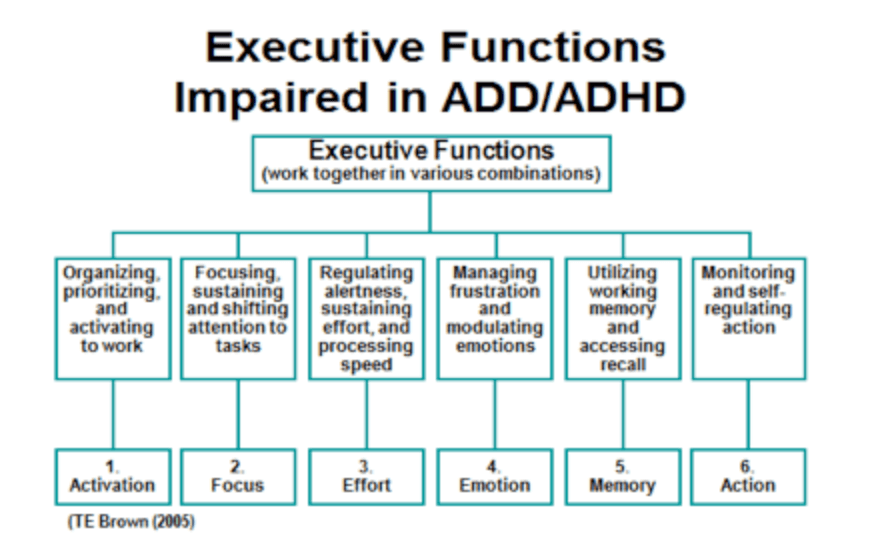
Poor executive function will show up in your life, there is no way around that.
Living with ADHD is all about self-regulation. Or lack thereof.
In the book Taking Charge of Adult ADHD, Russel Barkley explains:
“Executive functions are the specific self-directed actions that we use to control ourselves…Scientists label them differently, but executive functions generally include abilities like inhibition, working memory, emotional regulation, planning, and attention.”
Affiliate link. Please see my full disclosure policy.
What does this mean for us on a day-to-day basis?
It means that all of those annoying little quirks that get us in trouble, or make us feel ashamed of ourselves, are demonstrating how poor executive function can show up in your life.
We know what to do, the problem is we cannot get ourselves to do it.
This is how poor executive function will show up in your life

Thomas Brown’s model of Executive Function Impairments.
1. Activation
First, on the table above activation is described as organizing, prioritizing, and activating to work.
In your daily life this might show itself as:
-
– trouble getting started
-
– procrastination
-
– inability to prioritize
-
– issues problem solving
-
– chronic lateness
In a meeting at work you might have difficulty following the conversation, processing what you heard, and then getting yourself started on a new assignment.
While at home you might struggle to get started on mundane household tasks, or procrastinate until you are afraid to start.
2. Focus
Next on Brown’s table is Focus.
The word itself means a lot more than just paying attention to one thing at a time. Focus is described as focusing, sustaining, and shifting attention to tasks.
In your life this might show itself as:
-
– trouble staying on task
-
– getting sidetracked repeatedly
-
– hyperfocusing at inappropriate times
-
– lack of awareness when NOT sustaining attention
-
– inability to regulate attention
Have you ever been reading a book with your eyes skimming over the words, and then all of a sudden you realize you have no idea what you read?
Your eyes were reading but your brain was not. Similar
3. Effort
Another complicated issue is that of effort. Many people believe that ADHDers are simply not applying enough effort.
We both know ADHD is much more complicated than simply, “trying harder.”
Dr. Brown describes effort as regulating alertness, sustaining effort, and processing speed.
This looks like:
-
– problems processing and applying new information (Not the same as intellectual disability.)
-
– slow to respond or complete tasks
-
– trouble making decisions
-
– issues keeping oneself motivated after the “newness” rubs off
-
– feeling sluggish or drowsy (for inattentive presentation)
In my life, whenever I have to listen to anyone talk about a subject that is not interesting to me, I start to get drowsy. I’ve been known to sleep during boring movies as well.
4. Emotion
The topic of emotional regulation is the heart and soul of my work with ADHD. I spend a lot of time talking about emotions in the Enclave.
Dr. Brown describes emotion as managing frustration and modulating emotion.
This is how I see the impact of emotion in our lives:
-
– very poor frustration tolerance
-
– feeling emotions very intensely
-
– chronic low-grade depression or disinterest in life
-
– overly reactive to criticism (real or perceived)
-
– tendency to ruminate and form negative thought patterns leading to anxiety
-
– complete shut-down
-
– low self-esteem
Emotional regulation is gaining some ground with researchers, but we are just beginning to understand how profoundly this executive function impacts our lives and relationships.
Link to my original post on rejection sensitive dysphoria.
5. Memory
As a result of memory issues, We ADHDers have a notoriously hard time remembering things.
Dr. Brown describes memory as utilizing working memory and accessing recall.
Dr. Barkley has an excellent breakdown of verbal and non-verbal working memory in the book I mentioned above. I highly recommend you check it out. (Affiliate link)
This is what it might look like for you:
-
– short term memory problems
-
– poor recall of past events/details
-
– inability to hold more than 1 thing on your “brain shelf” at a time
-
– inability to apply learning from mistakes in the past to current decision making
-
– losing things frequently
-
– forgetting dates, appointments etc.
This is the deal with memory: If we cannot apply our past experiences and learning to what is happening right now, we cannot make good decisions.
Similarly, If we cannot hold more than one thing in mind at a time, we can’t perform everyday activities very well such as shopping, driving, and being on time.
No wonder we feel so frustrated all the time!
6. Action
Finally, Many people see the word action and assume it applies to hyperactivity. But action also applies to performing an action, or avoiding an action – physically controlling your body.
Dr. Brown’s action is described as monitoring and self-regulating.
Examples of EF issues with action:
-
– poor awareness in social situations (trouble reading the room)
-
– impulsive speech and movement
-
– impulsive decisions, spending
-
– trouble thinking before you act
-
– fidgeting
-
– poor handwriting
-
– inability to get your hands/body to do what you want
Do you blurt out your thoughts, or fidget? These are both good examples of action as an EF.
Poor executive function can have a tremendously negative impact on our lives.
In my next few posts, I will go in-depth on each of these EFs.
Click here to join the ADHD Enclave – My private community for ADHD women.



